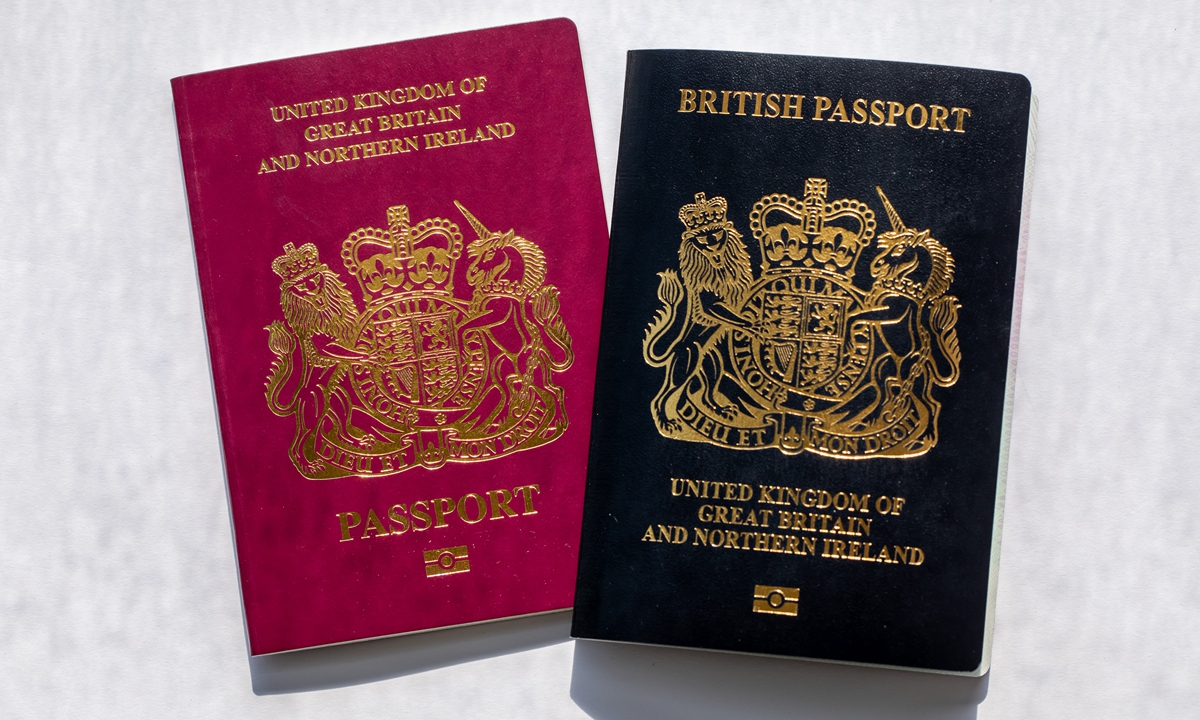BN(O) welcome package more of ‘a gesture'
$59 million impractical as ‘UK now can hardly look after itself’: expert

British passports Photo: VCG
Despite rising debt and an economic contraction amid the COVID-19 pandemic, the UK government on Thursday announced a program worth 43 million pounds ($59 million) to support Hong Kong BN(O) passport holders to settle in the country, leaving many Chinese observers wondering whether the plan will actually be implemented or will simply be a gesture.
The program is expected to help BN(O) passport holders from Hong Kong "access housing, work and educational support to ensure they are able to quickly integrate and contribute to their newfound communities," according to the press release from the UK government.
"It is highly unlikely that these policies will actually be implemented, as the UK now can hardly look after itself," Tang Fei, a member of the Chinese Association of Hong Kong and Macao Studies, told the Global Times.
The UK faces a poor fiscal situation, as its economy has been hard hit by the COVID-19 epidemic, Brexit, Scottish independence and other issues, Tang said. "What it needs is a lot of foreign investment, not the other way around."
The UK economy contracted 9.9 percent last year, reports said. The unemployment rate hit 5.1 percent, a five-year high, and it may reach as high as 6.5 percent this year, reports said.
In March, the UK unveiled a budget deficit of 271 billion pounds in fiscal 2021, taking the country's debt and deficit levels to their highest points in 50 years.
Under the new program, councils in England will receive 30.7 million pounds to provide help for new arrivals where needed, covering support with housing costs and learning English. Another 5.8 million pounds will go to Scotland, Wales and Northern Ireland to deliver similar policies.
A further 5 million pounds will be used to establish 12 "virtual" welcome hubs across the UK, to "help families and individuals access housing, education, and employment to build a life in the UK."
Cui Hongjian, director of the Department of European Studies at the China Institute of International Studies, told the Global Times that, given the amount of money involved, the plan is more of a gesture, as immigrants' integration into local society is a long-term project that involves various issues like ethnic culture, community construction, employment and facilities, and 43 million pounds is far from enough.
Cui thinks that the program is intended to convince some conservative groups in Britain that the government is trying to make immigrants integrate, and to some extent allay local concerns about the future of BN(O) passport holders.
The program will only embolden the minds of those who want to leave Hong Kong, Tang said.
"However, the UK has never promised that they will be granted citizenship after five or six years. It is possible that the UK government will turn its back on these people and kick them out," Tang said.
In January, the UK opened an application route for BN(O) passport holders in Hong Kong and their dependents to obtain British citizenship. Under this route, applicants can stay in the UK for up to five years and then apply for residency for a year before becoming British citizens.
The move has been repeatedly slammed by China as "interfering in China's domestic affairs." Starting on the same day, China officially withdrew its recognition of BN(O) passports as valid travel and ID documents.
"The UK's foremost concern about changes in the BN(O) policy in Hong Kong is to attract immigrants from Hong Kong to maintain a healthy labor force structure, and then use it to create an image of the UK supporting Hong Kong democracy and daring to confront China," Cui said.
At present, much of Britain's population growth comes from immigration due to its low native birth rate, Cui said. In the UK, native people are less willing to do jobs that are relatively simple or not so comfortable, such as maintenance and cleaning, which requires immigrants to do. These jobs are mostly taken by immigrants from Central and Eastern European countries.
However, since Brexit, the UK has been less willing to accept immigrants from the Central and Eastern European countries, one of the main immigrant sources for the country, Cui noted.



